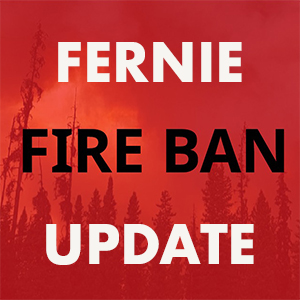In past weeks several Fernie locals have been fined for crossing the rail tracks on established paths and trails. Just recently trespassing signs have been posted at the local crossings that have been local paths for a century. The signs (below) are small easy to not notice. All track jay-walkers take notice—the fines have been $125 and could be considerably higher.

The officer involved has written these tickets with no prior warning to the individuals and according to those fined, the officer has been aggressive and obnoxious. What is provoking the sudden crack down on track crossings? Could it be the City’s issue with the excessive train horn blast—the quaint whistle went away decades ago?
Seasoned locals have a great affinity for the horn, some call is romantic, for most is symbolizes prosperity. No horn blasts mean no trains and no jobs at the local mines which send 16 trains per day through Fernie. Another few trains pass daily carrying extremely hazardous chemicals such as Ammonia, Chlorine, Hydrogen, Chloride and the other consumer based oils and gas. The trains and their historic fuel established Fernie in the early 1900’s and the connection remains as strong today as then.
The City, pressured by urban resident newcomers, requested the elimination of the excessive horn blast and CP Rail relied that a solution would be a barb wire fence running throughout the City. In short, it sounds like the barb has arrived, all that’s missing is the fence. The railway essentially cuts the town in half, perhaps the fence will offer a solution for everyone.

Who are these uniformed people?
The Canadian Pacific Police Service (CPPS) is a private police force enforcing safety and policing along Canadian Pacific Railway properties and rail lines in Canada and the United States, including limited sections of the Milton line of GO Transit in the Greater Toronto Area.
The Canadian Pacific Police Service is one of the oldest police services in Canada. CP Police Service, formerly CP Railway Police, have a long and storied past within Canada and CP Rail is a part of Canada’s history. Railway police were called upon many times to police railway towns, and to keep the peace during the building of the Canadian Railways from coast to coast. The railway police history dates many years and continues the tradition of protecting Canada’s vast section of railway.
In past years they had been downsized and numbered under 100 officers across Canada, however they are currently expanding their numbers across Canada. CP Police are also deployed throughout the CP Rail System in the USA.
Mandate
Canadian Pacific Police Service are responsible for all aspects of railway security. They are duly appointed and armed federal police officers that gather their authority in Canada via the Railway Safety Act as well as other acts.
The Railway Safety Act is a federal act that allows for any federal railway to appoint officers as police constables. These police constables have all the powers of a regular police officer as it relates to the protection of property owned, possessed or administered by a railway company and the protection of persons and property on that property. Railway police are unique in Canada as they are essentially a private company that employs sworn police officers.
The main duties of a railway police officer are to protect the public using the company facilities, the employees and its assets. This includes public education on trespassing, school awareness programs, investigating crimes against the railway, assist the local police services, issuing tickets and many other duties including security of property and buildings. CP Rail assigns individual officers large sections of railway tracks to patrol and conduct active enforcement and public safety initiatives.

The CP Police uniform consists of a dark blue shirt, dark blue cargo pants with body armour; they are armed with the usual police use of force equipment, as well as a Glock pistol. They are issued a standard police style forage cap. However, CP police do work in plain clothes capacity also.
Years ago, the CP Police provided police services to union station buildings, CP Hotels, CP Ships and CP Air. CP Rail is now their main responsibility, as the above CP departments have been sold off.
CP Police recruits attend different federal & provincial police academies as there is no government-mandated training college for railway police in Canada. Currently, CP Police have an agreement with the Lethbridge Regional Police Service and the Lethbridge College in Alberta, to provide recruit training to its new officers. In 2010, CP Police used the Saskatchewan Municipal Police College (SKPC) to train its recruits. The SKPC also offers continuing education and specialized courses to experience members. Before year 2010, CP Police recruits used to get their basic training at the RCMP Academy located at Depot in Regina, Saskatchewan. For specialized police training, members may have to attend different provincial police colleges as well as the Canadian Police College located at Ottawa.
All CP Police officers must have knowledge of federal and provincial laws as the railway properties cross many jurisdictions (Federal, Provincial, municipal, county) and have to collaborate with their respective police departments. The job of a railway police officer is sometimes lonely patrolling miles of track solo with little back up. They are paid on par with regular police officers in Canada and similar benefits. CP Rail is a private company and pays taxes that includes public police protection, thus CP Rail has downsized their police department over several decades. CP Rail Police numbers have remained steady at about 100 officers in the US and Canada. Jurisdictional public police departments maintain the overall responsibility for public safety and law enforcement in their respective territories including CP Rail property. However, CP Rail Police will assist local police if necessary and conduct its own investigations. CP Rail also uses its police department to conduct investigations into employee conduct dealing with collective agreement violations involving alcohol and drugs, as well as criminal matters.
If you get stopped keep in mind who you are dealing with…best to take the long route!
























